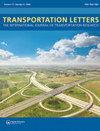在大流行病后人道主义物资分配模式中优化社会成本
IF 3.3
3区 工程技术
Q2 TRANSPORTATION
Transportation Letters-The International Journal of Transportation Research
Pub Date : 2025-04-21
DOI:10.1080/19427867.2024.2370669
引用次数: 0
摘要
在应对 COVID-19 大流行时,中国红十字会在分发医疗捐款方面发挥了关键作用,但初期工作效率低下,忽视了医务人员的作用。本文章由计算机程序翻译,如有差异,请以英文原文为准。
Optimizing social costs in post-pandemic humanitarian distribution models
In response to the COVID-19 pandemic, the Red Cross Society of China played a crucial role in distributing medical donations, but the initial efforts were inefficient and neglected medical personnel’s welfare. This study proposes a time-sensitive humanitarian distribution model that optimizes the social costs by integrating logistics and deprivation costs that cares about human suffering. We ues the Gini coefficient to evaluate delays in distribution, aiding trade-off analysis between logistics efforts and social welfare. Our findings show that the proposed model improves the Gini coefficient by an average of 33.96% across 500 scenarios. Additionally, investing 23.7% more in logistics costs reduces the Gini coefficient by 0.1, enhancing the social welfare of medical supplies distribution. Sensitivity analysis examines the impact of time delay and cost investment on the Gini coefficient, offering insights into balancing logistics investments and social welfare.
求助全文
通过发布文献求助,成功后即可免费获取论文全文。
去求助
来源期刊

Transportation Letters-The International Journal of Transportation Research
TRANSPORTATION SCIENCE & TECHNOLOGY-
CiteScore
6.40
自引率
14.30%
发文量
79
审稿时长
>12 weeks
期刊介绍:
Transportation Letters: The International Journal of Transportation Research is a quarterly journal that publishes high-quality peer-reviewed and mini-review papers as well as technical notes and book reviews on the state-of-the-art in transportation research.
The focus of Transportation Letters is on analytical and empirical findings, methodological papers, and theoretical and conceptual insights across all areas of research. Review resource papers that merge descriptions of the state-of-the-art with innovative and new methodological, theoretical, and conceptual insights spanning all areas of transportation research are invited and of particular interest.
 求助内容:
求助内容: 应助结果提醒方式:
应助结果提醒方式:


